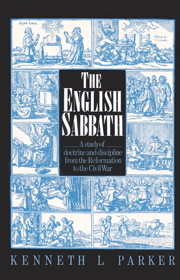Book contents
- Frontmatter
- Contents
- Acknowledgements
- Abbreviations
- 1 The case for a reappraisal
- 2 Medieval sabbatarianism and Reformation reaction
- 3 Early Elizabethan sabbatarianism: 1558–82
- 4 Late Elizabethan and Jacobean sabbatarianism: 1583–1617
- 5 The Book of Sports controversy: 1617–18
- 6 The 1620s: continued consensus
- 7 The sabbatarian controversy
- Epilogue
- Appendix
- Bibliography
- Index
6 - The 1620s: continued consensus
Published online by Cambridge University Press: 23 November 2009
- Frontmatter
- Contents
- Acknowledgements
- Abbreviations
- 1 The case for a reappraisal
- 2 Medieval sabbatarianism and Reformation reaction
- 3 Early Elizabethan sabbatarianism: 1558–82
- 4 Late Elizabethan and Jacobean sabbatarianism: 1583–1617
- 5 The Book of Sports controversy: 1617–18
- 6 The 1620s: continued consensus
- 7 The sabbatarian controversy
- Epilogue
- Appendix
- Bibliography
- Index
Summary
After the great attention given to the sabbath doctrine at the turn of the century, the 1610s were notable for the relative neglect of this issue. The reappearance of lengthy Sabbatarian studies after 1618 would seem to be the logical outcome of the Book of Sports controversy. However, while the declaration did prove controversial in the parliament of 1621, the attention of theologians was drawn towards a more pressing concern – the appearance of Saturday Sabbatarians in 1617. These judaizing Christians denied the divine institution of Sunday and observed Saturday according to the Jewish sabbath laws. While a few theologians attacked the scholastic interpretation as the source of this misunderstanding, all but two of the published works on the Sabbath defended the morally binding nature of the fourth precept. Indeed the scholastic interpretation remained the generally accepted view as late as 1633.
SATURDAY SABBATARIANS
Saturday Sabbatarians first appeared in the late 1610s as the result of a rather unusual ‘revelation’. During 1616 or 1617 Hamlet Jackson, a disciple of the judaizing preacher John Traske, was sent out to preach obedience to the Jewish ceremonial laws and to propagate Traske's own brand of latter day gnosticism. While Traske's sect strictly observed the Old Testament sabbath regulations, they observed Sunday and not Saturday – a practice which troubled Jackson. His apprehensions were ‘verified’ by a ‘Damascus road’ experience, as he travelled on a Saturday. Struck by a shining light, Jackson took this as a sign that the light of the Law was more fully understood by him than any other since the apostles.
- Type
- Chapter
- Information
- The English SabbathA Study of Doctrine and Discipline from the Reformation to the Civil War, pp. 161 - 177Publisher: Cambridge University PressPrint publication year: 1988



